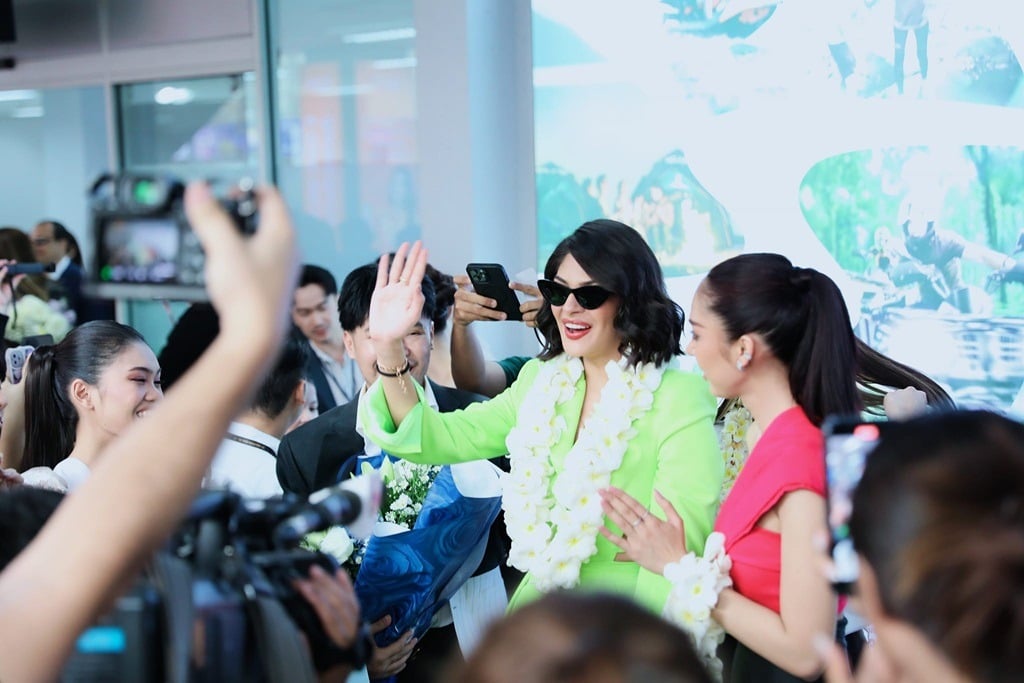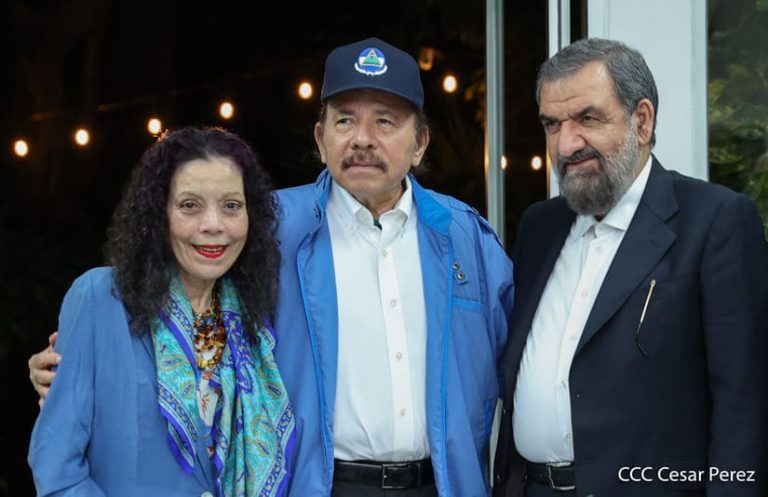18 de enero 2022

News About Sheynnis Palacios Not Covered by Media Operating in Nicaragua

PUBLICIDAD 1M
PUBLICIDAD 4D
PUBLICIDAD 5D
Lawyer for the victims, questions the fact that the immediate arrest of the Iranian was not requested even though he had an Interpol warrant

President Daniel Ortega greets Iran’s Vice President for Economic Affairs, Mohsen Rezai, Photo / Presidency.
The participation of Mohsen Rezai, a high-ranking Iranian official accused of masterminding the worst bombing in the history or Argentina -which left 84 dead in 1994-, as guest of honor at the new inauguration of Nicaraguan ruler Daniel Ortega, was condemned by the victims’ families.
Tomas Farini Duggan, lawyer for the victims, questioned on Friday Iran for the bombing, accused Argentina of covering it up and the Nicaraguan Executive of approving it by accepting the visit and a private meeting with Mohsen. This despite the existence of an Interpol red notice for Mohsen being one of those involved in the bombing of the “Asociación Mutual Israelita Argentina” (AMIA-Israeli Argentine Mutual Association).
“There is a hidden logic. The power of symbols is very strong. Bringing one of the accused, presenting him as a brother and doing it in front of the Argentinian ambassador, and the Argentinian government remains silent, is a symbol, it is no small feat. What they are trying to tell us is that Iran is the perpetrator of the attack and Argentina keeps quiet. And Nicaragua totally approves it; as do Cuba and Venezuela,” asserts Farini.
Farini explained that he and opposition deputy Waldo Wolff denounced before a federal judge the Argentine Foreign Minister Santiago Cafiero and the ambassador of that country in Nicaragua, Danilo Capitanich, since they must have previously known about the presence of the Iranian and asked for his arrest.
He said he is also aware of another complaint, involving Ortega, of which he did not offer details, noting he is not clear about the scope that the Argentinian justice system may have when investigating a foreign ruler.
For him, referring to Argentina, a “normal government” would have broken diplomatic relations in view of the offense and would have resigned from the Community of Latin American and Caribbean States (CELAC), a community of 33 countries in which the Argentinian President Alberto Fernández has just been elected president pro tempore with the vote of Nicaragua, and where Cuba and Venezuela also participate, whose leaders also met with Rezai in Managua.
The lawyer insisted on describing what happened as incomprehensible. And wondered why Iran decided to send an official accused of a crime to an official act of a country that identifies itself as a partner of Argentina. And the host ruler also could have asked them not to send him under the circumstances. For him, there was malicious intent.
Although the South American country’s Foreign Ministry issued a condemnation statement on January 11 (the day after the encounter) and described Rezai’s case as an “affront” to justice, the lawyer interpreted it that they tried to “save face.” “What had to happen is the request for arrest,” he added.
In recent days, El Clarin newspaper has published the background of Rezai, former commander of the Iranian Revolutionary Guards Corps during 1993 and 1994.
The Argentine judicial records cited in the newspaper state that Rezai is accused of participating in a select intelligence group, among them the Interior Minister Ahmad Vahidi, who evaluated the proposal to carry out the attack in Argentina during those years.
Vahidi was subject of a scandal for an event similar to Rezai’s in 2011 in Bolivia when Evo Morales asked him to leave his country immediately when Argentina complained about the minister’s presence at a military event in Santa Cruz.
The Revolutionary Guard has the mission of exporting the Iranian Revolution and Jihad (holy war). Farini explained that there is something he calls the “AMIA issue,” which consists of terrorist acts that shook Argentina in the 1990s.
The main events are two explosions that caused hundreds of victims. The first bombing is attributed to Islamic Jihad, the armed wing of Hezbollah, and it was against the Israeli Embassy in Buenos Aires in 1992. It left 22 dead and 350 injured. The second is the explosion at the Mutual in 1994 with 84 dead and more than 150 injured, which was planned by Iran and was executed by the Lebanese group.
The signing in 2013 of a memorandum of understanding under the government of Cristina Fernandez—now Vice President—between the Casa Rosada and Iran marked another important point in this story. According to lawyer Farini, impunity was sought for the Iranian citizens charged, which would be given by granting the operational autonomy of lifting the international arrests that weighted on those responsible, according to the seventh clause of the agreement.
The story took an even more unexpected turn when the prosecutor Alberto Nisman was about to denounce the then President Fernandez in the Iran case before the Argentine Congress on January 19, 2015, but he could not pursue the case, because a day before the accusation was to be levied he was found dead.
US Assistant Secretary of State for Western Hemisphere Affairs Brian A. Nichols denounced Ortega for undermining regional security.
“At his ‘inauguration,’ Ortega-Murillo were accompanied by Diaz Canel, Nicolas Maduro and Mohsen Rezai, an Iranian implicated in the AMIA bombing in Argentina. The hemisphere must not look the other way while Ortega-Murillo undermine democracy and regional security,” said Nichols.
In the week following the inauguration, the OAS and Israel also reacted with harsh criticism. Tel Aviv focused on Argentinian ambassador Daniel Capitanich, who was singled out for “sharing the ceremony with the Iranian, without withdrawing from the event or informing the authorities of such a serious situation.”
Since a few days before, Capitanich placed himself in a diplomatic storm unleashed by the agreements and disagreements between Nicaragua and Argentina. The diplomat had confirmed to the newspaper La Prensa that his country would send a delegation to Ortega’s inauguration, which did not happen.
Whether or not to attend the inauguration became a regional issue, because Ortega’s reelection is considered illegitimate by Argentina and 24 other countries that voted for an OAS resolution last November. Two months earlier, even Managua accused Buenos Aires of being an “instrument of imperialism” and denied support for the Argentinian President to be the president of CELAC. However, in a proof that what is said today about Latin American politics may be the opposite tomorrow, they finally endorsed him the same day Capitanich curiously announced that there would be a delegation.
A Nicaraguan diplomat explained that Ortega was “guatuseado (deceived),” by both Argentina and Mexico. Regarding the case of the Iranian, he explained that the Foreign Ministry did nothing because they needed someone of high political level to come to the event and because of the Argentinian snub.
“The strengthening of relations with Iran is part of Ortega’s policy of allying himself with the enemies of the US: the old axis Moscow, Havana, Teheran, now joined by the People’s Republic of China. He mistakenly thinks that his friendship with these countries will give him protection and international recognition,” added the source, who said that Rezai has diplomatic immunity in his capacity as Iran’s emissary.
Farini said that there was a request for arrest made later by the Argentinian Interpol to the Nicaraguan Interpol but acknowledged that the later belongs to the structures of the Nicaraguan Police. The supreme chief being Ortega himself.
“The Nicaraguan Interpol did not respond, because its officers depend on the Nicaraguan Police. It was logical that this was going to happen. (The Argentineans) did it belatedly when the scandal broke,” he remarked.
Other friends of Ortega, equally questioned in the international community, attended as guests of honor. Former Salvadoran presidents Mauricio Funes and Salvador Sanchez Ceren, accused of corruption in their country and naturalized by Ortega in Nicaragua, were two of them. Maduro himself is accused of drug trafficking in the US.
In contrast to the prominence of his controversial guests, Ortega’s inauguration, which marked the beginning of his 15th consecutive year in power, was characterized by isolation.
More than 40 countries did not recognize the electoral results, demanded the release of political prisoners and the cessation of repression against the citizenry. Nor did other representatives of civil society attend the presidential event. Ortega surrounded himself only with allies.
At their meeting at the secretariat of the ruling FSLN, Rezai told Ortega that they felt the need to come to Nicaragua. “Good friends have to accompany each other,” he was quoted as saying by international agencies.
“We have every disposition to collaborate and cooperate so that we can defeat US imperialism, and that is our duty as brothers, our obligation as brothers, to come and cooperate together,” said Rezai, one of the protagonists of a case marked by impunity in Argentina.
This article was originally published in Spanish in Confidencial and translated by Havana Times
Archivado como:
PUBLICIDAD 3M
Periodista nicaragüense, exiliado. Comenzó su carrera en el año 2000, cuando todavía era estudiante. Por sus destacadas investigaciones periodísticas ha ganado el Premio Ortega y Gasset, el Premio Internacional de Periodismo Rey de España, el Premio a la Excelencia de la Sociedad Interamericana de Prensa, y el Premio Latinoamericano de Periodismo de Investigación del Instituto Prensa y Sociedad (IPYS).
PUBLICIDAD 3D